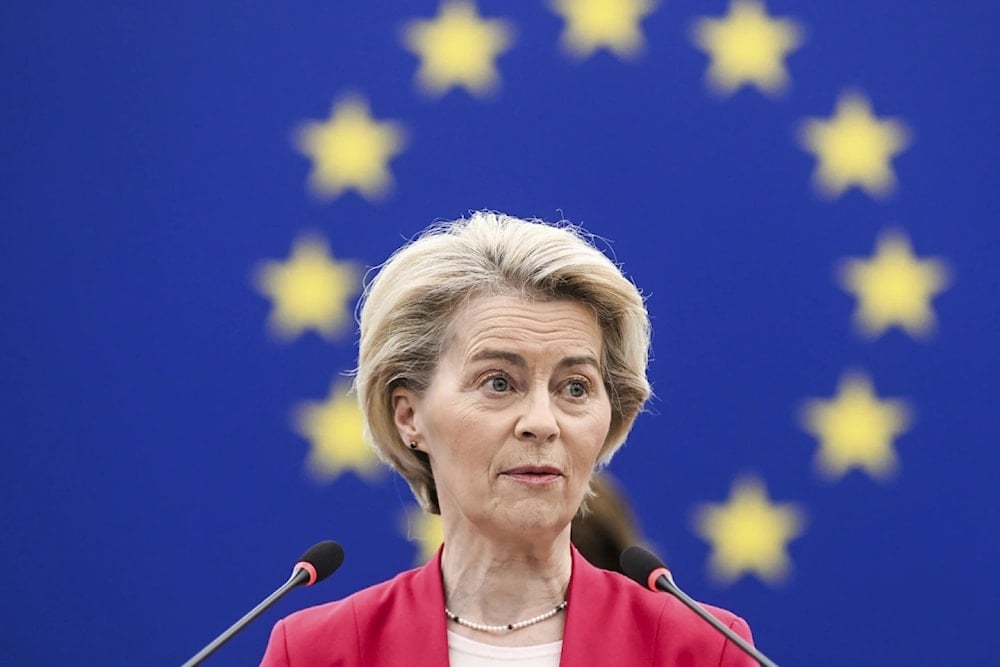EU military spending hits critical economic limit, Russia warns
Russia’s Venediktov warns that EU military spending could cripple the economy, as €500B in defense funds may divert resources from social programs.
-

European Commission president Ursula von der Leyen addresses European Parliament members on new plans to ramp up defense spending agreed at a March 2025 summit in Strasbourg, eastern France. (AP/Pascal Bastien)
The European Union’s rapidly expanding defense budget risks becoming an unsustainable economic burden, according to Deputy Secretary of the Russian Security Council Alexander Venediktov, who warned on Wednesday that projected military expenditures could destabilize social and economic frameworks across the continent.
In an interview with RIA Novosti, Venediktov cited expert projections that the European defense budget is expected to rise by €500 billion ($567 billion) over the next decade, as EU leadership prioritizes military development.
“According to expert estimates, the additional investments in the military sector planned by the EU leadership over the next decade could reach 500 billion euros [$567 billion]. Obviously, this will be done by cutting programs in healthcare, social support, education, that is, at the expense of ordinary Europeans,” he said.
Venediktov: €500 billion military plan will hit health, education
According to Venediktov, EU military spending has already reached what he called "a critical level for the EU economy," with current figures exceeding €320 billion in 2024 alone. He argued that the push for higher defense spending reflects a larger strategy by the European Commission and individual member states, including the UK, Germany, and the Baltic countries, which he warned could result in the erosion of essential public services.
The Russian Security Council official emphasized that the budgetary focus on armament will likely force governments to slash vital sectors such as education, health, and social support in order to sustain military outlays.
Venediktov further predicted that the proposed defense spending surge would significantly damage the EU’s macroeconomic indicators, aggravating pre-existing vulnerabilities in the continent’s energy and industrial sectors.
“The planned expenses will become an unbearable burden for the vast majority of European countries, where further economic stagnation, a growing energy crisis, and a decline in industrial production are predicted in 2025,” he said.
His remarks reflect Moscow’s ongoing criticism of NATO-aligned military expansions and a broader condemnation of what the Kremlin sees as militarization at the expense of social welfare.
Venediktov’s comments align with Russia’s longstanding stance that Western policies, particularly in relation to defense spending and sanctions, are short-sighted and detrimental to domestic stability within the EU.
As debates intensify over defense budgets and economic priorities, EU leaders are expected to face increasing scrutiny from both domestic constituencies and international observers regarding the long-term sustainability of their military strategies.
Germany’s industrial crisis reveals EU economic instability
A February 2024 Bloomberg report offers a critical real-world example that supports Alexander Venediktov’s warning about the EU’s growing economic instability. The report focused on Germany’s accelerating industrial decline, describing the loss of cheap Russian gas following the Ukraine war as the “final blow” to its manufacturing sector.
Once the EU’s economic powerhouse, Germany has seen century-old factories close and production shift abroad. The situation worsened after Berlin joined the 2022 boycott of Russian imports, leading to surging energy costs, mass layoffs at firms like BASF and Lanxess, and production cuts at Michelin and Goodyear.
At the time of the report, Russian President Vladimir Putin argued that EU leaders were “hurting their own people” under US pressure and condemned their silence over the Nord Stream sabotage, a series of underwater explosions in 2022 that disabled key pipelines delivering Russian gas to Germany, which Moscow attributes to the CIA.
On the other hand, as reported by the Associated Press (AP) earlier this month, Russia’s economy, despite mounting pressure, has outperformed many initial forecasts. Elevated defense spending has fueled short-term growth and kept unemployment low, even as it drives inflation. Wages have risen to match the cost of living, leaving many workers financially better off, while large enlistment bonuses and death benefits have channeled income into poorer regions.
Still, long-term vulnerabilities persist. Torbjörn Becker, Director of the Stockholm Institute of Transition Economics, told EU finance ministers that Russia’s financial system remains “not in balance,” warning of mounting risks tied to inflation and the absence of foreign investment.
The key question, he said, is how long Moscow’s militarized economy can sustain itself, and whether it can outlast Ukraine and its Western backers.

 4 Min Read
4 Min Read










